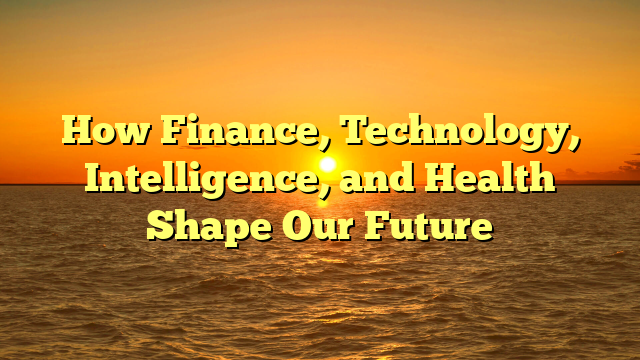Introduction: The intersection of finance, technology, intelligence, and health is becoming more pronounced as these fields continue to develop and influence each other. The synergies between them are expected to have profound effects on the future of economies, societies, and individual lives. This article delves into how these sectors interact and evolve, reshaping the way we understand health, finance, and technology.
Finance and Technology: Finance and technology have always been closely linked, but the advent of fintech has brought these fields even closer together. The use of artificial intelligence, ML, distributed ledger technology, and big data has revolutionized financial services. With fintech, companies can offer faster, more secure, and cost-effective solutions to clients, disrupting traditional banking and financial systems in the process.
AI is playing a pivotal role in revolutionizing finance, particularly in areas like predictive analytics, fraud detection, and risk management. By analyzing massive datasets, AI algorithms can help financial institutions identify patterns and make more informed decisions. Moreover, blockchain technology is reshaping traditional financial systems by creating decentralized platforms that eliminate the need for intermediaries, enhancing transparency, and reducing costs.
Intelligence and Technology: Artificial intelligence and machine learning are increasingly becoming vital components of various industries, especially in healthcare. AI is revolutionizing medical practices by providing doctors with powerful tools to enhance diagnosis, predict patient outcomes, and offer personalized treatment strategies based on data-driven insights. These innovations are enhancing healthcare delivery and transforming the patient experience.
In finance, AI is being used for automated trading, asset management, and fraud detection. By utilizing vast datasets, AI algorithms can optimize financial strategies and minimize human error, while also identifying patterns and trends that would be difficult for traditional systems to uncover.
Health and Technology: Technology is revolutionizing the healthcare sector by providing innovative tools for monitoring and managing health. Devices such as wearables and health tracking apps allow individuals to collect real-time data about their physical condition, empowering them to make healthier decisions and seek timely medical attention when needed. Furthermore, telemedicine platforms are offering greater access to healthcare services, especially in remote or underserved areas.
The advent of artificial intelligence in healthcare has also led to breakthroughs in drug discovery, personalized medicine, and patient care. By analyzing https://www.pulsemobilegames.com/ , AI-powered systems can identify potential treatments, predict outcomes, and help doctors make more accurate diagnoses. This level of precision has the potential to improve patient outcomes and reduce healthcare costs by enabling more targeted and effective interventions.
Conclusion: As we look toward the future, the integration of financial technology, artificial intelligence, digital health, and medicine will continue to create new opportunities for innovation and improvement. While challenges remain, particularly around data security, ethical considerations, and regulatory frameworks, the potential for these fields to work together to enhance our quality of life is immense. By embracing these advancements, we can create a more connected, efficient, and healthier world.
How Finance, Technology, Intelligence, and Health Shape Our Future


